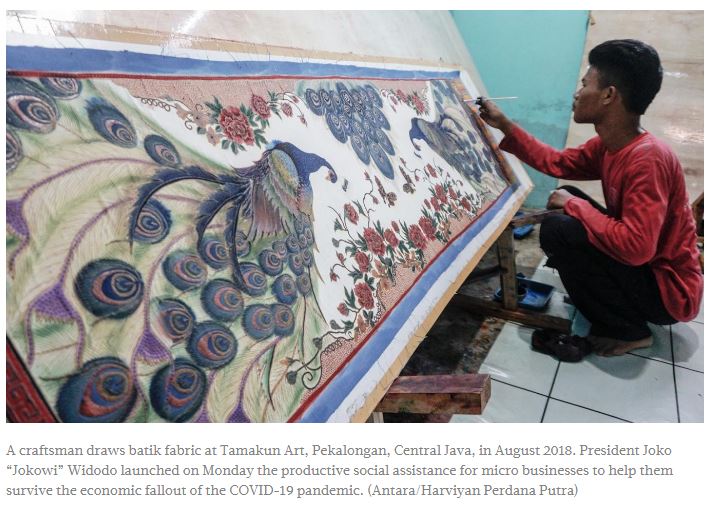Indonesia: Government disburses $163m for micro businesses
President Joko “Jokowi” Widodo has launched the productive social assistance program for micro businesses to help them survive the economic crisis caused by the COVID-19 pandemic.
The government started the program by disbursing Rp 2.4 trillion (US$162.9 million) directly to 1 million small businesses across the country, each receiving Rp 2.4 million. Businesses that have received other forms of government assistance, like an interest-rate subsidy or debt restructuring, cannot avail themselves of the new benefit.
“Once again, I need to remind you that this productive social assistance is a grant, not a loan. I hope you will use it as additional capital to add more goods to sell,” Jokowi said during a virtual press conference on Monday, addressing the recipients.
Indonesia’s economy relies heavily on small businesses, which account for more than 60 percent of the gross domestic product (GDP) and employ a majority of the labor force.
The assistance is meant to soften the economic blow of the pandemic, which shrank Indonesia’s economy by 5.32 percent year-on-year (yoy) in the April-June period.
With a budget reaching Rp 22 trillion for the first phase, the government seeks to aid 4.5 million micro businesses by the end of this month, and the number of recipients is expected to increase to 9.16 million by the end of September. It plans to cover 12 million enterprises in total eventually.
According to the Finance Ministry, state-owned pawnshop chain PT Pegadaian will disburse the funds to more than 59 percent of the 9.16 million recipients, followed by state-owned banks (32.09 percent), cooperatives and small and medium enterprise agencies nationwide (5.87 percent), the Cooperatives Movement (1.77 percent), regional development banks (0.88 percent) and rural micro lenders (0.03 percent).
Cooperatives and Small and Medium Enterprises (SMEs) Minister Teten Masduki said the government had compiled data of around 17 million small businesses from regional cooperatives and SMEs agencies, government ministries and agencies, state-owned banks, the Financial Services Authority (OJK), state-owned financing firms and cooperatives.
Teten said the assistance was especially aimed at micro businesses that had trouble getting loans from banks or did not have bank accounts at all.
“With this productive social assistance, we hope unbankable micro businesses can improve and resume their businesses,” said Teten. “Moreover, it can increase financial inclusion with the new bank accounts being registered by micro enterprises that have not been connected to the banks so far.”
The assistance comes as many small businesses struggle to survive the pandemic. According to a survey of 1,165 businesses conducted between April and May by the Asian Development Bank (ADB), 91.8 percent of small businesses said they needed loans without interest or collateral, and 89.5 percent demanded cash assistance or grants.
The government has allocated Rp 123.47 trillion in the state budget for small businesses as part of its COVID-19 rescue package amounting to Rp 695.2 trillion. Of the budget for SME assistance, the government has spent 36 percent so far.
Source: https://www.thejakartapost.com/news/2020/08/25/government-disburses-163m-for-micro-businesses.html


 English
English




